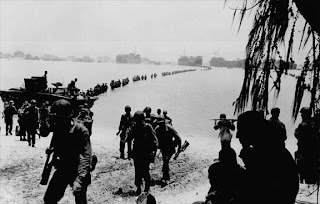Allies Invade Saipan
In early 1944 Toguri’s situation improved. She quit her part-time job at Domei and accepted a better paying full-time position as a secretary at the Danish legation. Her new job enabled her to add diplomatic rations of soap, sugar, and other scarce items to the supplies she smuggled to the Bunka POWs. Her friendship with Felipe d’Aquino evolved into a romance, and in May 1944 she moved to Felipe’s mother’s home. It was a two-and-half-hour commute to Tokyo, but Toguri was grateful for the opportunity to spend time in the countryside.
In the spring a Bunka guard beat Ince merclessly. His injuries were so severe that Tsuneishi removed him from broadcast. In late June Major Cousens suffered a heart attack. He was forty-one years old. He was hospitalized and never returned to the Zero Hour. With Cousens and Ince gone, Toguri faced a new challenge. The staff was now completely pro-Japanese, leaving her with no friends in the studio. She began skipping broadcasts. Although her absences provoked Major Tsuneishi, "Orphan Ann" had become so popular with Allied soldiers that he was reluctant to replace her.
As Allied forces moved closer to Japan, it became clear even to the most ardent Japanese patriot that losing the war was not a matter of “if” but “when.” In an effort to keep the growing audience tuned in to The Zero Hour, Major Tsuneishi minimized propaganda messages and increased music. Toguri was happy to comply. She encouraged her listeners to sing along with records, and she began referring to her boneheads as “you fighting GIs.” Although still in charge, Tsuneishi stayed out of day-to-day operations. Overseeing production was left to the second-rate Japanese staffers who replaced Cousens and Ince. Lackadaisical censors didn’t notice when Toguri played “Stars and Stripes Forever” after the American invasion of Saipan.
Quote - Gunn, p. 61
To be continued
